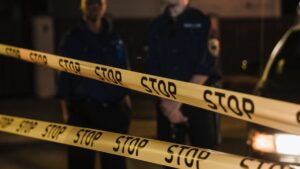The Trump administration has described Chicago as a “war zone” and ordered the deployment of 300 National Guard troops to the city. The decision has sparked major political backlash from Illinois leaders, who call it an unnecessary show of force.
Federal Action and Political Tensions
Homeland Security Secretary Kristi Noem defended the move during an interview on Fox News, saying the situation in Chicago demanded tougher federal action. Her comments came shortly after President Donald Trump signed the deployment order, ignoring strong opposition from Illinois Governor JB Pritzker and other state officials.
Trump on sending troops to Chicago: “We’re going in. I didn’t say when we’re going in.” pic.twitter.com/OnHMELhxUN
— Aaron Rupar (@atrupar) September 2, 2025
Political Divide Over Federal Intervention
Governor Pritzker accused Republicans of escalating the conflict to justify a federal crackdown. Speaking on CNN, he said, “They want to create a war zone so that they can send in even more troops. They need to get the heck out.”
Trump and his allies have repeatedly called for stronger federal involvement in Democrat-led cities. The former president has often claimed these areas are lawless and require firm action to restore order. Last week, he described the unrest as a “war from within.”
Legal Challenges to Troop Deployments
The plan to expand troop presence in U.S. cities has already hit legal roadblocks. In Portland, Oregon, a federal court temporarily blocked troop use, stating the administration’s justification was weak.
Judge Karin Immergut wrote that the violence in Portland did not amount to an organized rebellion, emphasizing, “This is a nation of constitutional law, not martial law.”
The court also found no evidence that the unrest met the legal definition of an insurrection under federal law.
Rising Tensions in Chicago
Tensions in Chicago have increased since the troop deployment. According to the Department of Homeland Security (DHS), a federal officer shot a motorist who allegedly rammed a patrol vehicle over the weekend.
In another incident on September 12, ICE officers fatally shot 38-year-old immigrant Silverio Villegas Gonzalez during a traffic stop. DHS claimed Gonzalez tried to flee and dragged an officer with his car.
Protests Over ICE Operations
The Trump administration has expanded the role of Immigration and Customs Enforcement (ICE), allowing more aggressive operations—sometimes involving unmarked vehicles. These tactics have triggered protests across several Democrat-controlled cities, where residents describe the methods as heavy-handed and politically motivated.
Public Opinion Divided
A CBS News poll released Sunday found most Americans oppose these deployments. About 58% disapprove of sending National Guard troops into cities, while 42% support the move.
Despite criticism and legal setbacks, the White House has not backed down. Trump aide Stephen Miller called the Portland court decision a “legal insurrection,” signaling the administration’s intent to continue sending federal forces into cities facing unrest.




